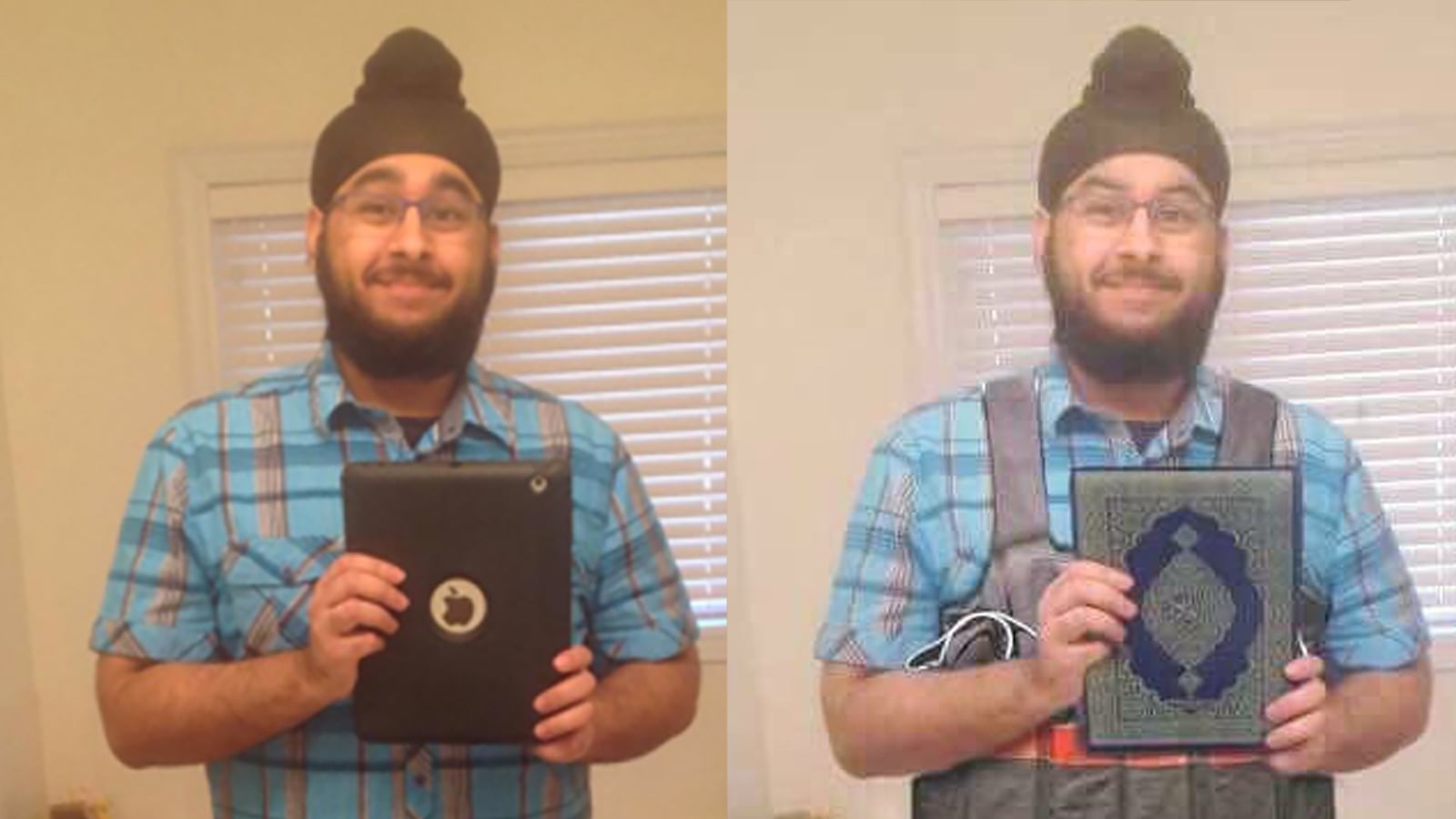Meet Veerender Jubbal.
I confess that, as with many other people I’ve only met through social media, I don’t know much about his personal life—how old he is exactly, whether he’s in a relationship, what he does for a living. He’s “Twitter famous” in the most arbitrary sense of the term; a random Torontonian Sikh with family in India and 12.4K Twitter followers who mostly posts about his interests and rarely about himself.
His English is sometimes awkward, being his second language, and his “takes” are sometimes naïve—as he has had to all-too-frequently say in the past year, he’s “just a kid.” But I’ve always been impressed with the sincerity and the earnestness with which he writes; he’s a relentlessly cheerful, positive person who refrains from personal attacks and negativity with a scrupulosity that’s rare in the vicious snark tank of modern-day Twitter. Part of his “brand” is refusing to use profanity, and responding to insults and trolling with a stone-faced “Gosh.” He’s even been given the honorary title of “Social Justice Healer” by his fans, and for a while his avatar was a picture a friend drew of him as a Blue Lantern—while the better-known superhero team the Green Lantern Corps is known for willpower and grit, their Blue Lantern counterparts are known for optimism and hope.
On Nov. 13, 2015, one of the worst terrorist attacks in history occurred in Paris, a coordinated series of bombings and shootings that left at least 132 dead and 300 injured. The radical Islamist terrorist organization known as “ISIS” or “Daesh,” based in Iraq and Syria, claimed responsibility.
On Nov. 14, 2015, a photo of Veerender Jubbal—a Sikh (not a Muslim) from Toronto, thousands of miles away from Paris or from the Middle East—was misidentified as a photo of one of the Paris terrorists by pro-Daesh groups online.
A newspaper in Spain, La Razón, ran Veerender’s photo on its front page as “One of the terrorists.” An Italian TV channel, TG24, similarly put up his photo as a stand-in for “the terrorists.” He’s reported that he’s now seeing his photo everywhere with stories across Europe, Asia, and the U.S. talking about the “controversy” over his doctored photo.
I wouldn’t go so far as to say Veerender’s life has been ruined by this experience. These things pass, and it’s hopefully getting easier to cope with them as people—especially prospective employers—begin to realize how unpredictable and irrational online shitstorms can be.
But this is going to haunt Veerender’s Google results for the rest of his life, probably. It will be an ongoing risk factor should he ever need to pass a background check. In the wake of the fear and rage after the Paris attacks—and the general climate of Islamophobia that doesn’t seem to be going away anytime soon—it very much puts his life at risk.
What the hell did Veerender do to deserve this? Why, out of everyone in the world, did he end up being the victim of such a sadistic, senseless “prank?”
Well, see, it’s because he criticized video games.
The only reason Veerender is “newsworthy” is because along with his interest in anime and his hobby of swapping selfies with his online friend—one of which got Photoshopped into the aforementioned “terrorist” pic—he also loves video games. He talks about things he likes and doesn’t like in video games. One of the things he doesn’t like is that, as a Sikh who has a hard time finding positive portrayals of brown South Asian dudes in general and Sikhs in particular, he feels that his favorite games are less welcoming to him than white guys.
In May 2014 he made the mistake of saying so publicly, writing a single tweet about Far Cry 4’s disturbing box art showing a light-skinned man forcing a brown-skinned man to his knees. He said so in the mildest possible way one can air a serious concern: “Hope you are all well. Just wanted to say—the box art is racist.” No profanity, no rage. The bare minimum of a “callout.”
In response, he received a flood of threats, attacks, and racial slurs. As he said at the time, “I wrote two tweets. I had responses for ten whole days.” The reactionary gaming culture sworn to destroy people they labeled as “identity politicians” and “SJWs” out to ruin their games had marked him as a target, even though it hadn’t yet gotten a name or a clubhouse.
That was only the beginning. A few months later, in August, the reactionaries got a name (“GamerGate”) and a clubhouse (the r/KotakuInAction subreddit, 8chan, and their insurgent presence as an unending horde of Twitter eggs and anime avatars) and a strongly established ideological commitment to halting political and cultural change in the gaming industry as some kind of holy crusade.
GamerGaters, raised in a dysfunctional world of rankings on leaderboards and “grinding,” tended to celebrate the fact that they were able to keep the #GamerGate hashtag trending through tireless, endless repetitive tweeting of links, retweeting of each other, and creation of new accounts. As gamers with a distorted sense of reality based on thinking of everything in quantifiable numerical terms, they seemed to think this spamming of Twitter—terrifying their targets but mostly confusing and bewildering bystanders—constituted “winning.”
So when a “counter-hashtag” successfully trended for a while in October—#StopGamerGate2014—their reaction was immediate, intense, and disproportionate as hell. And as is typical for their “movement,” it became a personalized attack against the poor guy who had the misfortune to “start” the hashtag by being the first one to tweet into it: Veerender Jubbal.
Being Veerender Jubbal online has not been a pleasant experience since then. Those two strikes were enough to damn him in the eyes of GamerGate zealots as an “enemy of gaming” and to make everything he said and he did fair game for massive waves of harassment and trolling.
It got to the point that, in February, he quit Twitter for several months despite having a strong social network of friends and well-wishers there, because that network had been so poisoned by the trolls.
Veerender isn’t the only person who’s been slimed by GamerGate. He’s not even the first person who’s been slimed by GamerGate by them Photoshopping him to look like a suicide bomber (they did it to me).
Nor is this instance, when GamerGate trolling broke out into the “real world” media, in any sense the beginning of their harassment of Veerender. They’ve been mocking him by Photoshopping him into photos of 9/11 for months. They Photoshopped screenshots of his tweets to libel him with false quotes, justifying harassing him as an “anti-white racist.”
Their by-now predictable response to this latest incident is to complain that there’s no proof the particular racist vile troll who made this particular Photoshopped image of Veerender is “truly GamerGate” (as though their deliberately amorphous, leaderless “hashtag movement” has any official membership rolls).
They draw an equivalence between putting an innocent Sikh man at risk for racist violence and Veerender’s supposed offense of accusing “innocent gamers” of racism. Their favorite new news organization, Breitbart Tech, publishes a high school bully-style sarcastic condemnation of the Photoshopped image while insulting Veerender and snickering about his situation.
I can only respond the way I’ve been responding for a long time to these hilarious shenanigans: This is not a game.
We live in a world that has yet to adapt to instant mass communication on the scale of modern social media in many ways. It’s not just possible but easy to manipulate publications hungry for clicks into ruining someone’s life or career over nothing—Breitbart, in particular, has made an art of doing so. Even a small-scale social media shitstorm can easily lead to one particularly zealous person crossing the line to get a SWAT team sent to your house—or to your family’s.
The trolls who are intent on denying that games and media and Internet “bantz” should be treated as real or have real-life consequences keep pushing the envelope. The people who trumpet that no consequences and no moral considerations should be allowed to compromise their absolute freedom of speech keep going further to make their point.
We are at the point where a bloody, horrifying tragedy is fair game to be exploited in order to fuck with a random, innocent person the Internet hate machine has decided needs to be taken down. Where Veerender’s possible death is something to laugh and joke about, as is the diversion of attention and resources from real perpetrators.
The for-profit “legitimate” mainstream media sources that put his face in the newspaper and on TV bear the biggest lapse of responsibility, yes, and I hope his family successfully sues them for defamation. But the blisteringly rapid instant-gratification no-time-for-fact-checking news cycle of “legitimate” media is a response to the pressure they constantly experience from social media. Veerender’s doctored image wouldn’t have gone viral in the first place if not for a great mass of unaccountable civilians deliberately spreading it for shits and giggles with the hope of screwing with his life.
The anonymous person who created that image and the many, many anonymous people who shared it bear responsibility for the damage done to Veerender’s life and to his safety. In a just world, people would be afraid to pull off pranks of this caliber because they’d face not only moral responsibility but legal liability.
Unfortunately, under the current legal regime, we don’t live in that world. I’m hoping to be proven wrong, but judging from the many other times things like this have happened, the anons responsible are probably high-fiving each other about how successfully they’ve upended a random person’s life and created a massive media tumult over their shitty Photoshop job. They won’t be found, they won’t be prosecuted, and they’ll be emboldened to continue stepping up their sick, sociopathic game until they eventually get bored or they finally go too far and step into an actual FBI sting.
The intensity of the game of ruining lives keeps ramping up. We keep getting platitudes using terms like “bullying” or “trolling” that implicitly diminish this game to a mere annoyance, something to toughen up and ignore. We keep getting promises from the people making massive profits off of all this online activity and “engagement” that they’ll do better without any evidence of change.
Veerender is safe, for now. Most of the people I know who’ve been trying to weather this storm are safe, for now—jobs have been lost, homes have been fled, countless productive hours lost to fear and anger and social media damage control. But gamers “trolling” feminists on Twitter haven’t yet literally gotten someone killed—at least not someone famous enough for me to have heard of them.
I suspect it’s only a matter of time.






